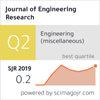A decision support system for sustainable supplier selection problem: Evidence from a radiator manufacturing industry
IF 0.9
4区 工程技术
Q3 ENGINEERING, MULTIDISCIPLINARY
引用次数: 0
Abstract
Supplier selection is the basis of a successful supply chain. It is also a key factor in improving the competitiveness of an organization. Being a complex process, the supplier selection plays an important role in upgrading the supply chain. The purpose of this research is to present an integrated approach based on fuzzy best-worst method (BWM) and failure mode and effects analysis (FMEA) for sustainable supplier selection considering seasonal quantity discounts and supplier risk for a radiator manufacturing company. Therefore, as the aim implies, this study addresses how organizations develop a sustainable supplier selection framework by integrating linear programming and decision-making in presence of seasonal discounts. To this end, fuzzy BWM and FMEA were employed to calculate weighting factors for different selection criteria and evaluate the supplier risk, respectively. Then, suppliers were ranked using the so-called technique for order of preference by similarity to ideal solution (TOPSIS). Finally, the discount type was examined by the LP-metric method. Results of the fuzzy BWM showed that the customer satisfaction was the criterion of highest priority, followed by long-term relationship, and then pollution control, among the total of 13 criteria considered in this work. Outputs of the TOPSIS referred to the supplier 3 as the top-ranked supplier, followed by supplier 6 and then supplier 1.
可持续供应商选择问题的决策支持系统:来自散热器制造行业的证据
供应商的选择是供应链成功的基础。它也是提高组织竞争力的关键因素。供应商选择是一个复杂的过程,在供应链升级中起着重要的作用。本研究的目的是提出一种基于模糊最佳-最差法(BWM)和失效模式与影响分析(FMEA)的综合方法,用于考虑季节性数量折扣和供应商风险的散热器制造企业的可持续供应商选择。因此,正如目的所暗示的那样,本研究解决了组织如何通过整合线性规划和存在季节性折扣的决策来开发可持续的供应商选择框架。为此,采用模糊模糊模糊模型和FMEA分别计算不同选择准则的权重因子,对供应商风险进行评价。然后,利用所谓的“理想解决方案相似性排序技术”(TOPSIS)对供应商进行排序。最后,用LP-metric方法检验了折扣类型。模糊BWM的结果表明,在本工作考虑的13个标准中,客户满意度是优先级最高的标准,其次是长期关系,然后是污染控制。TOPSIS的输出将供应商3称为排名最高的供应商,其次是供应商6,然后是供应商1。
本文章由计算机程序翻译,如有差异,请以英文原文为准。
求助全文
约1分钟内获得全文
求助全文
来源期刊

Journal of Engineering Research
ENGINEERING, MULTIDISCIPLINARY-
CiteScore
1.60
自引率
10.00%
发文量
181
审稿时长
20 weeks
期刊介绍:
Journal of Engineering Research (JER) is a international, peer reviewed journal which publishes full length original research papers, reviews, case studies related to all areas of Engineering such as: Civil, Mechanical, Industrial, Electrical, Computer, Chemical, Petroleum, Aerospace, Architectural, Biomedical, Coastal, Environmental, Marine & Ocean, Metallurgical & Materials, software, Surveying, Systems and Manufacturing Engineering. In particular, JER focuses on innovative approaches and methods that contribute to solving the environmental and manufacturing problems, which exist primarily in the Arabian Gulf region and the Middle East countries. Kuwait University used to publish the Journal "Kuwait Journal of Science and Engineering" (ISSN: 1024-8684), which included Science and Engineering articles since 1974. In 2011 the decision was taken to split KJSE into two independent Journals - "Journal of Engineering Research "(JER) and "Kuwait Journal of Science" (KJS).
 求助内容:
求助内容: 应助结果提醒方式:
应助结果提醒方式:


